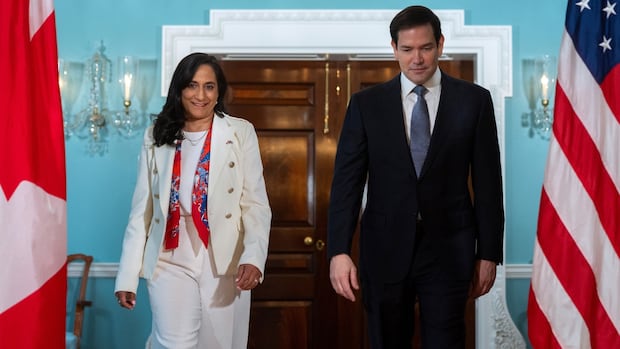Foreign affairs minister says she has ‘utmost confidence’ in ICC judge sanctioned by U.S.

Canada’s Foreign Affairs Minister Anita Anand recently stated that she has had a conversation with a Canadian International Criminal Court judge who is facing sanctions from the United States. However, Anand did not directly address the actions taken by Washington in her comments.
The U.S. government imposed sanctions on Judge Kimberly Prost and three other ICC judges, accusing them of playing a significant role in past decisions to investigate U.S. officials and prosecute Israeli leaders. The State Department specifically mentioned that Prost was sanctioned for authorizing the ICC’s investigation into U.S. personnel in Afghanistan.
In her first public remarks on the matter, Anand expressed her full confidence in Judge Prost but did not explicitly mention the sanctions imposed by the U.S. She emphasized the importance of impartiality and objectivity in the judiciary, including those serving in international courts.
Anand thanked Judge Prost and all ICC judges for their essential work in upholding the mission of the judicial body. Along with Prost, ICC jurists Nicolas Guillou of France, Nazhat Shameem Khan of Fiji, and Mame Mandiaye Niang of Senegal were also sanctioned by the U.S. The State Department’s decision was linked to the ICC’s investigation into Israel’s actions in Gaza and the West Bank.
As a result of the sanctions, any assets held by the sanctioned judges in U.S. jurisdictions are frozen. Senator Marco Rubio characterized the ICC as a national security threat and criticized its alleged judicial overreach. The ICC rejected the U.S. sanctions, calling them a “flagrant attack” on the institution’s independence.
Judge Prost was part of an ICC appeals chamber that authorized the prosecutor to investigate alleged war crimes and crimes against humanity in Afghanistan involving U.S. service members. The ICC also issued arrest warrants for Israeli Prime Minister Benjamin Netanyahu and former defense chief Yoav Gallant for alleged war crimes during the Gaza conflict.
The ICC, based in The Hague, has jurisdiction over genocide, crimes against humanity, war crimes, and crimes of aggression. While Canada is a member of the ICC, the U.S. and Israel are not signatories to the court.
The situation involving the ICC judges and the U.S. sanctions underscores the complex dynamics between international judicial bodies and the actions of individual nations. It remains to be seen how this issue will impact the ICC’s ability to carry out its mandate effectively.




